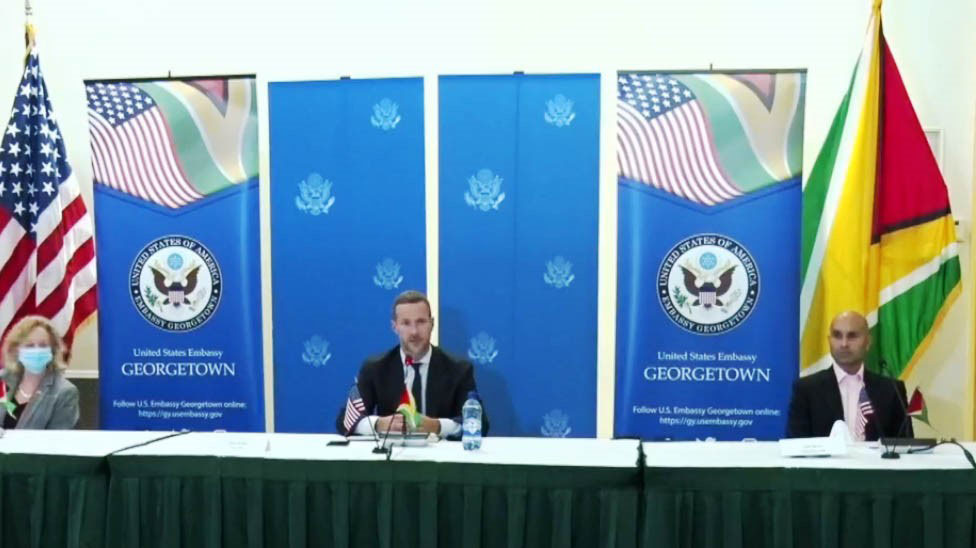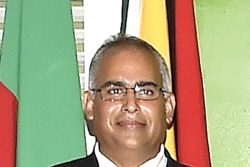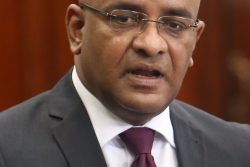Following a visit under the Donald Trump administration from the US’s International Development Finance Corporation (DFC) a number of local companies applied for financing but will have to await “direction” in line with the Joe Biden administration’s strong focus on climate change.
“There are a number of companies that are applying for DFC financing and are going through the due diligence process. The Biden administration has committed to adding climate change into every aspect of policy and engagement, and that includes the DFC,” the United States Embassy replied recently to Stabroek News when asked for an update, following the DFC’s delegation visit here last year.
Guyana’s Minister of Foreign Affairs Hugh Todd explained that given the change of government in the US, this country waits to be guided on a way forward.
“We’ve had a change in the US administration – we are awaiting their direction“, Todd told his newspaper recently.
In the run up the US elections last November and in the aftermath of the high-profile visit of them US Secretary of State, Mike Pompeo, head of America’s development bank, Adam Boehler and a team of investment officials last October visited Guyana and met with a number of government officials and this country’s private sector.
Then, he had said that how to get the cost of electricity down so that the average person pays less was one of the questions asked by the private sector and facilitating access to cheap power was among key issues for possible assistance.
The US government delegation comprised of officials from the US Department of Treasury, the US Export-Import Bank, the Department of State, the National Security Council and the Department of Homeland Security, on a mission that he had said would “build” on Pompeo’s visit to Guyana and Suriname.
He had been quick to point out that the US was not looking to invest only in mega projects here and noted that talks with the Private Sector Commission (PSC) were also about “investments in small- and medium-sized businesses. We talked about investments in agriculture and farmers… at the end of the day one of my main goals at the DFC is to increase the amount of jobs and [the] livelihood of the individual person living here in Guyana.”
“What is important to me is not the amount of money but the impact we are going to have. We will look at projects in the multimillions to hundreds of billions of dollars down to projects that are going to get $500 to a small entrepreneur that needs it,” he said.
Guyana’s private sector awaits decisions to continue discussions.
Former Private Sector Commission Chairman Nicholas Boyer told this newspaper recently that up to when he left as head two months ago, “conversations were still ongoing” between the two sides.
Traction
US political and economic analysts have weighed in on why since that visit here, there has been no traction. A link was also drawn to the ongoing geopolitical contest in the region between the United States and China.
In an opinion piece – `China reminds us why the Caribbean is vital to US strategic interests’ – written by research professor of Latin American studies at the U.S. Army War College Strategic Studies Institute Dr.Evan Ellis, Senior fellow in the Americas Program at the Center for Strategic and International Studies Ryan Berg and former DFC Former Senior Advisor Kristie Pellecchia, the DFC’s visit is referenced. Pellecchia is also principal of Pellecchia International, an advisory firm focused on capital markets, policy and partnerships.
The authors note that given the strategic position of the Caribbean, it is not surprising that China is also working to build its presence there, or that, with a relative dearth of U.S. resources, the region has been receptive.
“China has thus far refrained from building expensive bases or engaging in provocative military alliances, yet it has built a no less significant web of influence through gifts, political courtship, loan-backed infrastructure projects, including strategically located ports, tourism and logistics-sector investments, as well as participation in the region’s bauxite, gold, timber and petroleum sectors,” it states.
“An important part of that diversity is the region’s economic base. While tourism has played an important role in the livelihood of many Caribbean nations, in Guyana and Suriname, as in Trinidad and Tobago, the development of the nation’s oil wealth is key to the national economy and plans for development. In Guyana, the discovery of at least 8 billion barrels of recoverable oil, whose commercial production came on-line in 2020, has begun to transform what was once one of the Caribbean basin’s poorest countries into what is expected to be one of its wealthiest. By 2025, according to the IMF, Guyana’s per capita GDP is set to pass US$15,000, a four-fold jump in just a decade,” it adds.
The article points out Guyana is “an important success story for the United States” as it related that relations once soured between the US and the PPP/C were seemingly reknitted when the US “pressured the Partnership for National Unity (APNU) government of David Granger, with which it had had positive relations, to respect elections called for under the Guyanese constitution, and to honor their results, although the ultimate result was APNU’s defeat by the People’s Progressive Party (PPP), with whom U.S. relations had previously been difficult.”
The article adds that “In the process, the U.S. gained an important partner in the new PPP government of Irfaan Ali, which has supported Washington in the region on issues from Venezuela and Cuba to restraint in its dealings with the PRC, even as oil wealth began to transform the country.”
But it points out that while both China and the US are fighting for economic links with Guyana, the US seems to have put on the back burner financing for this country because of Biden’s policies.
“It is thus remarkable that there has been no serious progress on projects in Guyana by the Development Finance Corporation, designed largely to provide vulnerable countries an alternative to predatory Chinese economic projects. One likely reason is that Guyana’s oil-driven miracle is inconveniently out of step with the `all green energy’ framework driving concepts within the left in both the Biden administration and Capitol Hill”, they said.
They reasoned that Guyana’s example “highlights how overzealous application of environmental piety as a policy filter disrespects Caribbean diversity, with respect to the composition of its economies, the needs of its peoples and the strategic imperatives of China’s advance.”
The authors believe that the United States “can and should pursue endeavors that support environmentally friendly energy in the countries and situations where they make sense, but not by expecting our partners to set aside their best short-term hope for economic development because it does not align with Washington’s current environmental piety.”
Contending that however much the Irfaan Ali government has sought, in good faith, to accommodate the U.S., they believe that it “is unrealistic and arrogant to presume that Guyana would halt its dramatic and long-anticipated economic transformation mid-course, relegating itself to marginally productive sugar and rice farming while awaiting vague promises of alternative future “green development” options on the scale of its oil.”
“Despite the present government’s goodwill toward the U.S., if Washington refuses to work with Guyana because its economic miracle is based on oil, the most likely reaction of its leadership will be to shrug and work with the Chinese, unnecessarily deepening the influence of China in the country and the Caribbean and increasing potential governance problems. The U.S. has only to look to Guyana’s neighbor Venezuela, where “state-owned” PDVSA has China as its most important creditor,” the article stated.
The US Embassy here says that the Biden government remains committed to helping Guyana, in line with international best practices.
“We remain committed to private sector led energy and infrastructure development, and we support Guyana’s continued efforts to reform and simplify its system to enable a more open and transparent investment climate in line with international best practices that can attract quality companies to Guyana,” the US Embassy stated.







